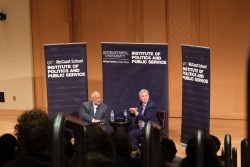Following a push from students and GUSA, the University is slated to pass an alcohol amnesty amendment sometime in the span of this semester. Under the provision, if a student is sexually assaulted under the influence of alcohol, he or she will be protected from being charged with alcohol-related violations.
“We will not bring secondary charges involving underage alcohol use against either party when adjudicating sexual assault cases,” said Judy Johnson, director of the Office of Student Conduct.
In general, sexual assault survivors are afforded multiple protections under Title IX, the federal law which prohibits sex discrimination in educational programs that receive public funding. However, amnesty policies, which are not regulated yet, vary across universities around the country. The Office of Civil Rights in the Department of Education has remained highly involved, and in April 2011, it issued a “Dear Colleague” letter to colleges and universities which addressed sexual assault, and it warned that in sexual assault situations involving alcohol or drug influence, “Schools should consider whether their disciplinary policies have a chilling effect on victims’ or other students’ reporting of sexual violence offenses.”
“Schools across the country, including Georgetown, have been working to implement these changes over the last few years,” said Laura Kovach, director of the Women’s Center.
However, the amendment is not intended to be revolutionary at Georgetown. The de facto policy has already been that of amnesty for some time.
“The practice is that students have not been charged … It’s been our practice [for a while]. We are just codifying it now,” said Jeanne Lord, Associate Vice-President for Student Affairs.
Nonetheless, many students and even staff members on campus are unclear about sexual assault policy. Five interviewed residential assistants, one counselor, and five Residential Life administration members were unsure or could not answer whether Georgetown had a codified amnesty policy.
“I think it’s fair to say that there has been some confusion, so that is why what we want to do right now is clarify it,” Lord said.
Much of the confusion is due to the length and technicality of the code. Students have complained about the difficulty of navigating the document, which stands at 28 pages after the recent revision.
Ben Manzione (SFS’ 15), co-director of the Student Advocacy Office, stated that the recent revamp of the code was intended on streamlining it and improving accessibility. However, the document was released without two key appendices, the sanctioning guidelines and the student conduct procedures manual. The latter, which was removed out of the old code of conduct, lists the procedure that happens when sexual assault or misconduct is reported.
When asked when the new manual would be published, Johnson responded that the office was “still working through it” and that it would be out “certainly before the weekend, if not later today [Wednesday], then by tomorrow.” She added that “there are so many tweaks that must go into it.”
Michelle Mohr (COL’15), other co-director of the Student Advocacy Office, agreed that awareness was a problem and stated that “it is the policy, but it’s just not the written down policy yet … we hope it increases awareness as well as people’s certainty that it will be upheld.”
With regards to other drugs, the administration has stated that the upcoming amnesty amendment will only consider alcohol charges, not other kind of violations.
“Alcohol is the issue we deal with most commonly, so that is what we focused on. Drugs are more complicated. That is more nuanced. … At this point, we are not considering [drug amnesty], but that is not to say that could not be a topic of conversation later,” said Lord, adding that the amendment will “absolutely” be passed within the semester.
Other items on the agenda for the semester include a change of the definitions of sexual assault and sexual misconduct in the code of conduct to reflect the legal definitions. The administration is looking also to revive the Sexual Assault Working Group, which has existed for over a decade but has not met for over a year and a half.
Additionally, the University will soon release a new Title IX website that aims to further clarify sexual assault policy and resources available. Lord, who also serves as Deputy Coordinator of Title IX for undergraduate students, explained that the website was slated to go up shortly, adding that easy accessibility to students is a main priority.
Overall, administration and students alike expressed optimism but also discussed the need for further work.
“Our goal is to have a safe community, to enhance the safety and wellbeing of all members of our community, legal requirements aside … I think we’ve done some good work, but significant challenges remain.” Lord said.





The title of this article is extremely misleading, the university has operated under the alcohol amnesty policy for years it is simply being included in the code now to clarify the issue for students. The title of this article makes it seem as if there has been a change in University policy not just the addition of clarifying language to the code.